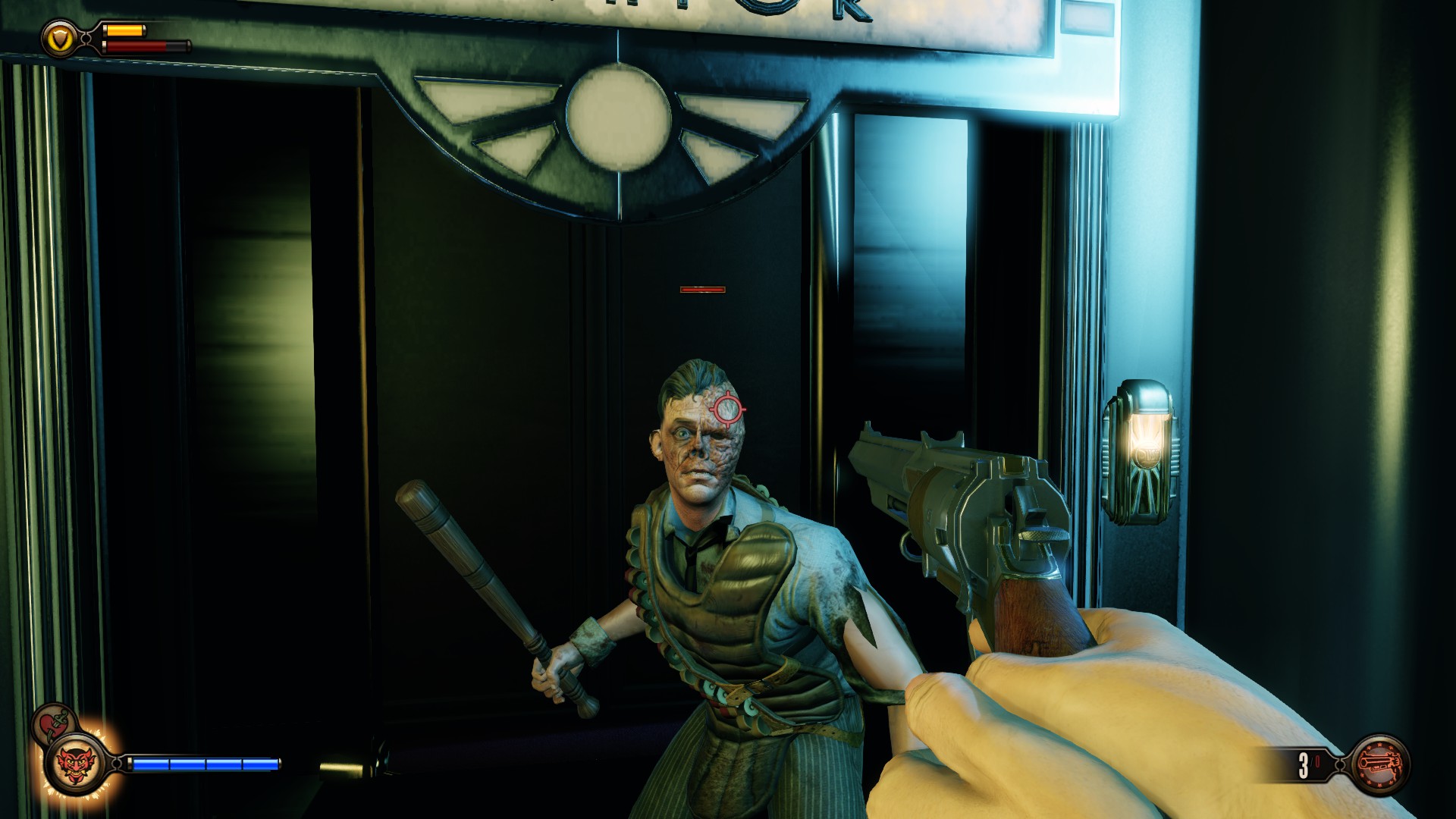A few days ago, the second and final episode of the "Burial at Sea" DLC for "BioShock Infinite" was released. The first episode was received with mixed reviews: while it was a blast to go to pre-fall Rapture, it was generally considered too short and gameplay-wise lacking. Let's have a closer look at the whole oevre, now that we have access to it. Just as a quick overview: The original BioShock took place in the underwater-city of Rapture, an Ayn-Rand-nightmare, while BioShock Infinite took place in Columbia, a flying city in which the idea of American Exceptionalism had gone overdrive. Both worlds are connected through a web of possible realities and dimension portals.
 |
| Not the Elizabeth we deserve, but the Elizabeth we need. |
In "Burial at Sea", Elizabeth, the famed side-kick from BioShock Infinite, returns. We find ourselves in Rapture before the fall (and the events of the first game), where Booker deWitt for some reason is an old detective with no memories of Colombia. Obviously, we're in some alternate reality. Elizabeth, now a grown femme fatalle instead of the innocent girl rescued in BioShock Infinite, hires Booker to rescue a Little Sister. To accomplish this, Booker needs to explore Rapture in a beautiful setting - that is over way too soon.
Quickly, he and Elizabeth are sent down to the sunken part of Rapture, where the rebellious Atlas was exiled, and the latter parts of the first episode are the already known "running and gunning" that the game really doesn't that well. The weapons are all feeling alike, a common criticism hurled at the BioShock series, and exploring such an interesting and complex world with a weapon as the primary instrument of interaction is only considered a good idea on certain executive floors. Guns blazing, the story continues to its very short conclusion - after two hours at the most, Booker de Witt lays dying on the floor, betrayed by Elizabeth.
In the second part of "Burial at Sea", you are taking the role of Elizabeth for the first time. Here the game shows what BioShock could have been had someone had the guts earlier: Elizabeth isn't an action hero; instead, she's sneaking around hitting enemies from behind or avoiding them alltogether. The Big Daddys, for example, are invincible instead of just packing some punch, which makes them far more intimidating and dangerous.
You are exploring the world, finding audio logs and codes, and getting past some of the most gratuitous mini-games of the last time (opening doors). But as a whole, the episode is damn intriguing. The gameplay is much more near what BioShock should have been - more Deus Ex, less Call of Duty. Unfortunately, the lesser instincts kick in in the finale, where suddenly a mass of enemies awaits you to be gunned down or otherwise dispatched.
The story is also a bit of a mixed bag. Like in the previous games, the part where you explore the strange and fascinating world are the best and most interesting, while the mystery and the final reveals really fall short. In BioShock Infinite, we learned that there were parallel universes that are connected. Well, duh. Now, Elizabeth sacrifices herself...to bring down Atlas in the end, which she could have achieved by not helping him destroy Rapture?
The question of destiny is used way too often. Destiny is almost always a weak storytelling device and seldom done right, and BioShock squarely falls into the "not done right" category. Why is all of this so important? I never know, the game doesn't tell me. Instead, I only know that for some reason, events had to spell out exactly like shown. It comes across as if the designers were a bit too smart for their own good. A littlebit more grounded narratives would be called for.
We can only hope that Ken Levine will deliver on such when he is freed of bockbluster conventionalities. BioShock has a great core with really interesting, detailled worlds, but the possibilities to do something with it are squandered for some second-rate mysticism and third-rate gun-blazing. A shame.






U svojoj ulozi radim s odjelima za osiguranje, obradu, financiranje i drugim odjelima. Svaki od ovih timova dolazi s ogromnim bogatstvom znanja. To mi omogućuje da steknem više znanja o svojoj ulozi i pružim članovima bolje iskustvo. Dobijte svoju financijsku slobodu od nas danas. Dugujete li, trebate zajam, brz i pouzdan, ovo je mjesto za dobivanje vjerodostojnih zajmova. Nudimo poslovne zajmove, studentske zajmove, stambene zajmove, osobne zajmove itd. Kamatna stopa zajma od 3%. Kontaktirajte nas danas. Imate priliku dobiti novčani zajam u iznosu od 2000 (€$£) – 5.000.000 – 100.000.000 (€$£) s mogućnošću otplate od 1 godine do 45 godina bez jamstva nekretnine. Viber: +385915608706 WhatsApp: +385915608706 E-pošta: hybridalliantcreditunion@gmail.com © 2025 Alliant Credit Union 11545 W. Touhy Ave., Chicago, IL 60666 Usmjeravanje #271081528
ReplyDelete